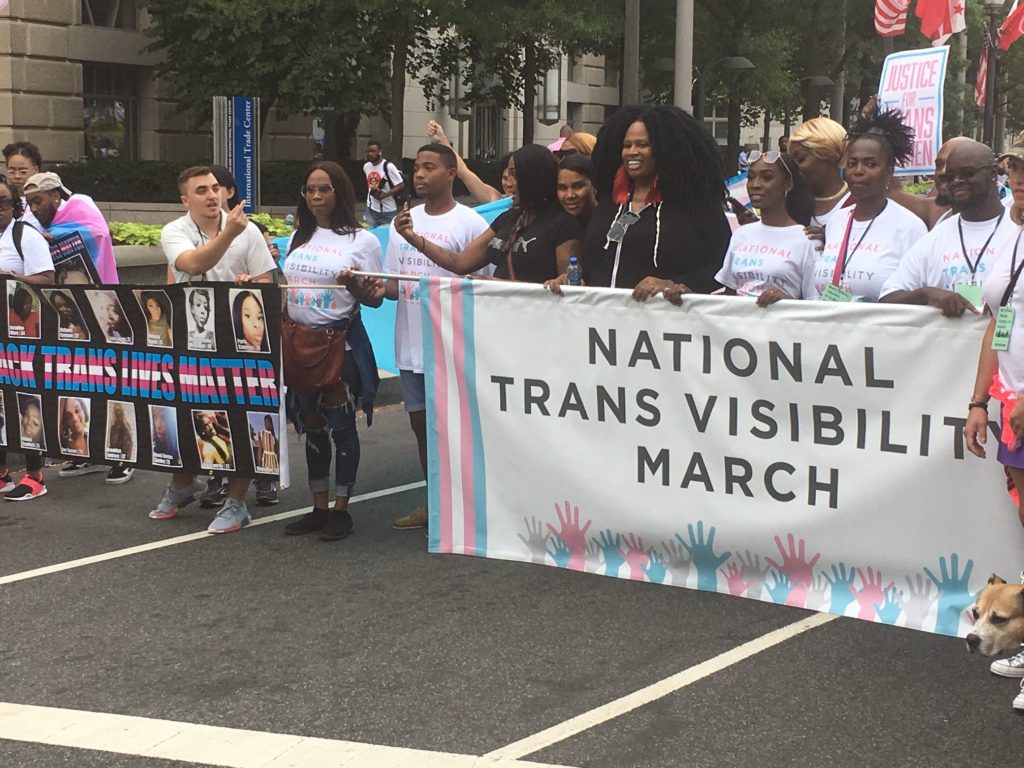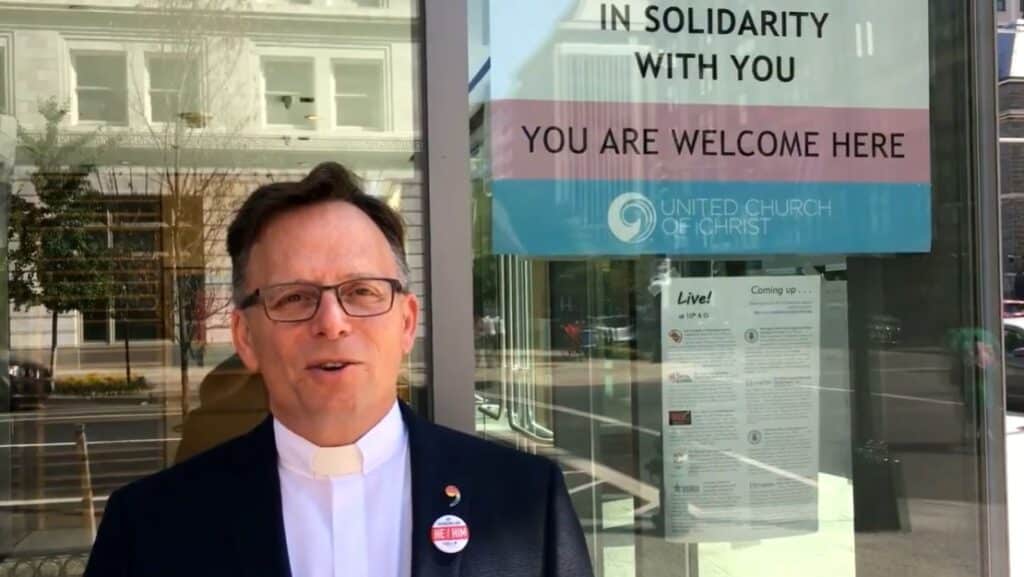Ahead of retirement, UCC’s Schuenemeyer honored with national trans ally award
In the last two decades, visibility for transgender and nonbinary people has grown expansively. Within the United Church of Christ, efforts toward trans justice, solidarity and inclusion also increase each year.
That’s thanks to the work and ministry of people like the Rev. Mike Schuenemeyer. Since 2002, Schuenemeyer has been leading the church’s ever-growing trans justice movement as minister and team leader of the UCC’s Health and Wholeness Advocacy Ministries. He’s also Executive Director of the UCC HIV & AIDS Network.
“I’ve been in this role for 20 years, and I loved the work that I’ve done,” he said.
Now, as Schuenemeyer plans to pass the torch to the next generation of leaders with his retirement on Dec. 2, he’s being celebrated nationally for his years of service to the cause.
The National Trans Visibility March honored him with a 2022 Community Ally/Leadership Torch Award during a ceremony in California on Dec. 4.
“Michael is a hero,” said Marissa Miller, founder of NTVM, in presenting Schuenemeyer with the award. “Michael is an ally that is a verb, not the noun.”
For Schuenemeyer, the honor was particularly meaningful at this stage in his career.
“I’m not someone who’s received a lot of awards over the years, but I can say that this ranks up there,” he said.
Trans visibility on a national scale
NTVM brings awareness to gaps where justice is lacking and mobilizes people in events around the country, Schuenemeyer explained.
“The idea is to bring visibility to trans and nonbinary experiences,” he said of the organization.
The organization stepped into the spotlight with marches, beginning in 2019 in Washington, D.C. The UCC — and Schuenemeyer — participated from the start.
“From the very first National Trans Visibility March in D.C., Mike has worked to represent the UCC as a strong, consistent partner in the quest for trans rights and justice,” said UCC Associate General Minister, the Rev. Traci Blackmon. “Initially received with wise caution, we are now the lead religious sponsor of the annual gathering, and Mike is lead coordinator for the spiritual portion of the weekend.”
She called the award “a fitting tribute for the many contributions and many ways Mike has served with and among us all of these years.”
While receiving the Torch Award is much appreciated, Schuenemeyer knows there’s always more work to be done. In fact, he believes that raising awareness of trans and nonbinary experiences is more important than ever.
Trans lives under attack
“Trans and nonbinary lives have particularly been attacked because of legislation, but also because of abuse and violence,” Schuenemeyer said.
In some states, he added, legislation includes potentially criminalizing parents for providing gender-affirming care for their children. This rise in anti-trans laws and violence underscores the importance of positions like his.
So, even on the brink of retirement, Schuenemeyer continues his quest to increase awareness of trans rights. He believes that support and affirmation for trans and nonbinary people must come especially from their church communities.
“The voices that have been fomenting (hate) unfortunately have been religious voices,” he said, adding that media coverage has amplified them.
Because of this, Schuenemeyer stresses that churches have a responsibility to extend God’s extravagant welcome — and that includes offering love and showing solidarity to trans and nonbinary members.
“Everyone is a child of God and has worth and dignity,” he said.
Churches can help
The UCC has a long history as religious leader in promoting LGBTQ+ rights in the United States. That legacy is evident in the ministry and growth of the Open and Affirming Coalition. Not to mention the more than 1,700 churches that have adopted an ONA covenant.

But there’s still room to learn and grow in working for trans justice.
“I think that, particularly in the UCC — although we have a long way to go — there’s been some increasing trans visibility,” Schuenemeyer said. “And I think that (includes) the intentional way that the Open and Affirming Coalition has encouraged local churches to … make sure that they are providing a just and inclusive welcome for trans and nonbinary members.”
Schuenemeyer noted that trans inclusion is now one of the criteria in the ONA process. This, in turn, has increased conversations within congregations about how to best welcome and include trans and nonbinary members.
Coupled with a growing abundance of resources, Schuenemeyer said this has allowed churches to “learn more about the rainbow of God’s community.”
A future for trans justice
The key to this communal learning is centering the experiences of those who have been marginalized.
“When we create a space where we can receive or hear the authentic experience of people who are God’s children, we’re going to learn from that,” he said.
And that’s exactly what Schuenemeyer has tried to do for 20 years.

He recalled the trans visibility work that the UCC already had started when he took his position in September 2002. At that time, an idea for a new UCC documentary about trans experiences was in the works. That film eventually became Call Me Malcolm.
The project didn’t have its title yet. One of Schuenemeyer’s early assignments was to help identify its subject: the Rev. Malcolm Himschoot.
Call Me Malcolm was one of the first films the UCC ever produced that it intentionally marketed to film festivals, Schuenemeyer noted. And, he added, its purpose to increase the visibility of trans Christians still resonates.
Years later, as Schuenemeyer prepares to retire from his official position as a trans rights advocate, his burning desire for religious communities — and society in general — to see and center their trans members remains strong.
“My part has always been to amplify the lived experiences of trans and nonbinary people,” he said.
Content on ucc.org is copyrighted by the National Setting of the United Church of Christ and may be only shared according to the guidelines outlined here.
Related News
A Prophetic Call for Justice and Peace in Palestine
The executive leaders of the United Church of Christ have issued the following statement...
Read More‘Love is Greater Than Fear’: Regional Youth Events get to the heart of gospel message
United Church of Christ teens attending this summer’s Regional Youth Events (RYE) are...
Read MoreUCC desk calendars available to order now
Prepare for your day, month and year with the United Church of Christ desk calendar —...
Read More


